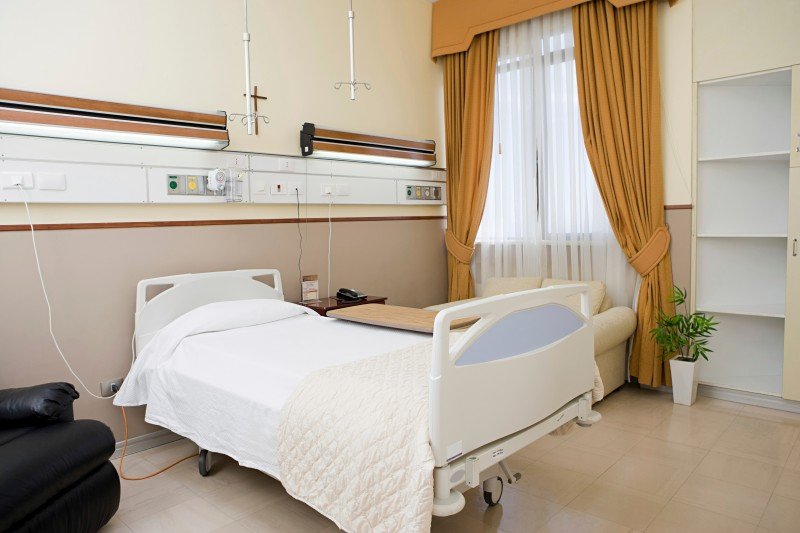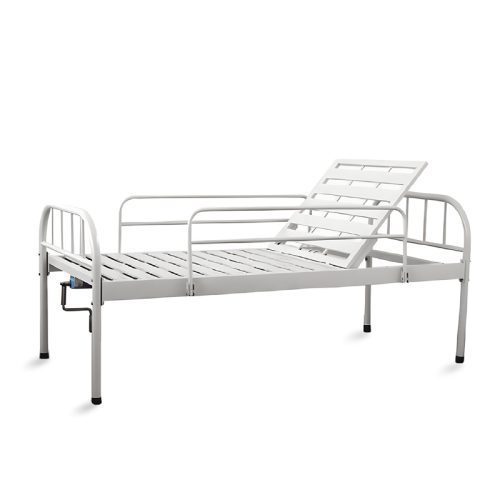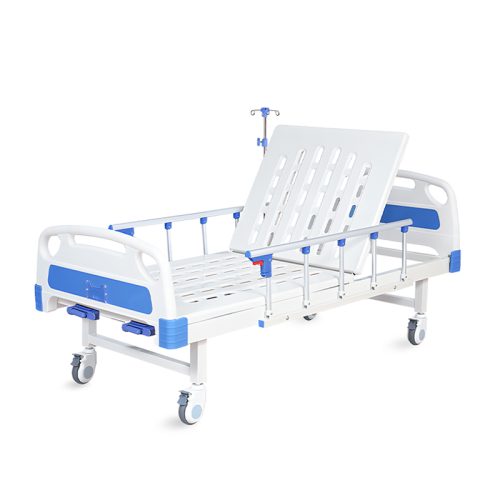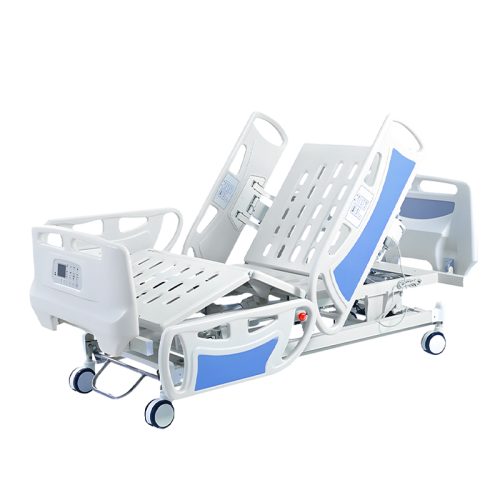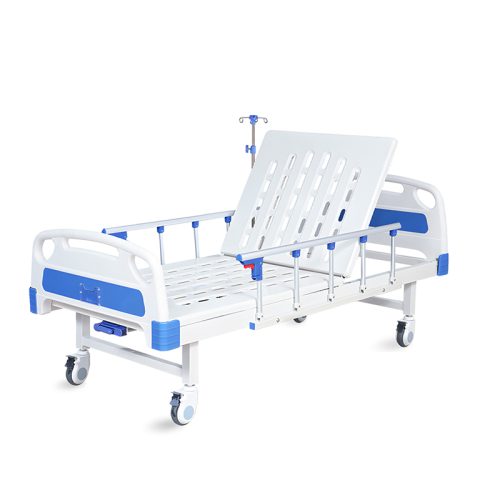
- Cama de hospital
O guia definitivo para colchões de cama de hospital em 2025
- Por kelingmedical
Porque é que um colchão de cama de hospital é importante
No que diz respeito aos cuidados de saúde dos doentes, um colchão de cama de hospital vai para além de fornecer uma superfície para dormir, pois funciona como uma ferramenta vital para os cuidados dos doentes. A seleção adequada do colchão ajuda a prevenir escaras, melhorando a circulação e aumentando o conforto do doente. Os doentes que permanecem na cama durante longos períodos de tempo necessitam de colchões de alta qualidade para proteger a sua pele de danos e evitar o desenvolvimento de úlceras de pressão.
Os colchões das camas de hospital funcionam para distribuir o peso por toda a superfície, o que ajuda a diminuir a pressão nas zonas sensíveis, incluindo ancas, ombros e calcanhares.
Os doentes que dormem em colchões confortáveis têm um sono melhor, o que favorece a recuperação e mantém a saúde geral.
Um design superior do colchão permite que os prestadores de cuidados de saúde reposicionem os doentes mais facilmente, minimizando os riscos de lesões para ambas as partes.
Tipos de colchões para camas de hospital
Existem várias opções de colchões para camas de hospital para responder às diferentes necessidades dos doentes. Ao conhecer os diferentes tipos de colchões, pode selecionar a opção mais adequada às suas necessidades específicas.
Os colchões de espuma oferecem apoio e conforto básicos, mantendo-se acessíveis e leves. Os colchões de espuma proporcionam apoio e conforto suficientes para os doentes que têm uma probabilidade mínima de desenvolver úlceras de pressão. Os doentes que não se podem mover facilmente podem necessitar de mais alívio da pressão do que os colchões de espuma podem proporcionar.
Os colchões de ar proporcionam um apoio ajustável combinado com o alívio da pressão através de múltiplas células de ar. Os colchões de ar são a melhor opção para os doentes que têm uma elevada probabilidade de desenvolver escaras ou que necessitam de se reposicionar regularmente ao longo do dia. Alguns colchões de ar utilizam sistemas de pressão alternada que movem o ar entre as células para aliviar a pressão em áreas específicas.
Um colchão de gel integra camadas de espuma e de gel para proporcionar um conforto superior e um melhor alívio da pressão. Os doentes que sofrem de dores crónicas ou têm pele sensível são os que mais beneficiam com estes colchões.
Os colchões híbridos integram vários materiais, incluindo espuma, gel e ar, para proporcionar um apoio equilibrado, juntamente com conforto e alívio da pressão. Estes colchões satisfazem as necessidades de diversas populações de doentes.
Os colchões bariátricos são construídos para suportar doentes mais pesados através da sua estrutura reforçada e maior capacidade de peso. Os colchões bariátricos proporcionam um maior apoio e aliviam a pressão para os utilizadores que necessitam destas caraterísticas.
Ao selecionar um colchão de cama de hospital, é necessário examinar as caraterísticas específicas para encontrar a melhor solução para as suas necessidades.
A escolha do seu colchão de cama de hospital deve ser orientada pela avaliação destas caraterísticas para encontrar a solução ideal para as suas necessidades.
Escolha um colchão que distribua o peso pelo seu corpo para minimizar a pressão nas zonas sensíveis. O sistema de pressão alternada dos colchões de ar torna-os especialmente eficazes para proporcionar o apoio e o alívio de pressão necessários.
A capa impermeável de um colchão protege-o de derrames de líquidos e bactérias, facilitando a manutenção.
Os doentes com pele sensível ou alergias beneficiarão de colchões hipoalergénicos que previnem reacções cutâneas e respostas alérgicas.
Um colchão durável que mantenha a sua estrutura contra o desgaste é essencial para os doentes que necessitam de cuidados médicos prolongados.
Para uma higiene óptima dos cuidados do doente, selecione um colchão que simplifique as tarefas de limpeza e manutenção.
Certifique-se de que o colchão corresponde às especificações de tamanho e tipo da sua cama de hospital.
A seleção de um colchão de cama hospitalar adequado implica a avaliação das necessidades do doente, das restrições financeiras e das condições do ambiente de prestação de cuidados.
A escolha de um colchão de cama de hospital adequado exige uma avaliação exaustiva dos requisitos do doente, das considerações financeiras e do ambiente de prestação de cuidados.
Avaliar as necessidades do doente, examinando o seu peso, a sua mobilidade e o risco potencial de desenvolver úlceras de pressão. Os doentes com elevada suscetibilidade de desenvolver escaras devem utilizar um colchão de ar equipado com um sistema de pressão alternada.
O custo dos colchões para camas de hospital apresenta variações significativas, pelo que é importante definir o seu orçamento antes de escolher um. Um colchão de qualidade superior representa um melhor investimento para um valor a longo prazo.
Selecione um modelo de colchão que simplifique a limpeza e a manutenção quando planear utilizá-lo em casa. Os estabelecimentos de saúde dão prioridade à durabilidade e ao controlo de infecções quando selecionam colchões para camas hospitalares.
Um profissional de saúde oferece informações e recomendações essenciais adaptadas às necessidades individuais de cada paciente.
Conselhos para a manutenção de um colchão de cama de hospital
Assegurar a manutenção regular de um colchão de cama hospitalar é fundamental para manter a sua vida útil funcional.
Limpe regularmente o colchão para evitar a acumulação de sujidade e bactérias. Para limpar as superfícies, utilize um detergente suave misturado com água morna, mas evite produtos químicos agressivos, pois podem danificar o colchão.
Examine regularmente o colchão para detetar quaisquer indicadores de danos, incluindo rasgões ou células de ar desinsufladas e furos. Resolva os problemas logo que os detecte para evitar danos adicionais.
A rotação regular do colchão distribui o desgaste pela superfície, o que ajuda a prolongar a sua vida útil.
Para manter a sua garantia, cumpra todas as diretrizes de utilização e manutenção fornecidas pelo fabricante.
Os compradores de colchões para camas de hospital devem evitar os erros típicos que podem resultar no comprometimento dos cuidados prestados aos doentes e em despesas inesperadas.
Os doentes sentem desconforto e resultados adversos, enquanto os hospitais enfrentam encargos financeiros quando selecionam colchões inadequados. Eis alguns erros comuns a evitar:
Uma solução de colchão pode funcionar bem para um doente, mas não satisfazer os requisitos de outro doente. Ao selecionar um colchão, tenha em conta os requisitos únicos e as condições médicas de cada doente.
Escolher apenas com base no preço pode levar a um colchão que não proporciona o apoio e o alívio de pressão necessários.
O colchão que escolher deve adaptar-se corretamente à sua cama de hospital para evitar problemas de compatibilidade.
A manutenção correta do colchão é essencial para o manter funcional ao longo do tempo. A não realização de limpezas e inspecções de rotina causará uma deterioração precoce.
Conclusão
A seleção de um colchão de cama hospitalar adequado é uma escolha essencial, porque afecta o conforto e a segurança do doente, desempenhando também um papel vital na sua recuperação. Ao estudar os tipos de colchões e as suas caraterísticas essenciais, bem como os conselhos de manutenção, poderá fazer escolhas mais adequadas às suas necessidades específicas. A seleção do tipo de colchão adequado, como espuma, ar, gel ou híbrido, garante tranquilidade e melhora o bem-estar do seu doente ou ente querido.
FAQ
P: Que tipo de colchão para camas de hospital é melhor para prevenir as úlceras de pressão? R: Os doentes beneficiam muito com os colchões de ar equipados com sistemas de pressão alternada que ajudam a prevenir e a tratar as úlceras de pressão.
P: Os colchões normais não têm as caraterísticas necessárias para funcionar corretamente com as camas de hospital. R: Os colchões normais não cumprem os requisitos específicos das camas de hospital no que respeita ao alívio da pressão e à compatibilidade do sistema. Os colchões para camas hospitalares devem ser escolhidos com base na sua conceção para camas hospitalares.
P: A frequência de substituição de um colchão de cama de hospital depende da sua qualidade e utilização, mas geralmente situa-se entre 3 e 5 anos ou quando aparecem sinais de desgaste. R: O que determina a duração de um colchão de cama hospitalar é a sua qualidade e a frequência com que é utilizado. Um colchão deve ser substituído a cada 3-5 anos ou quando se manifestam sinais de desgaste.
P: Os colchões das camas de hospital estão cobertos pelo seguro? R: Algumas apólices de seguro de saúde podem cobrir a compra de um colchão de cama de hospital quando um profissional de saúde determinar que é necessário. Informe-se junto da sua seguradora sobre os pormenores.
📧 Email: inquiry@shkeling.com
🌐 Sítio Web: www.shkeling.com.cn
Estamos ansiosos por construir uma parceria de sucesso consigo!

